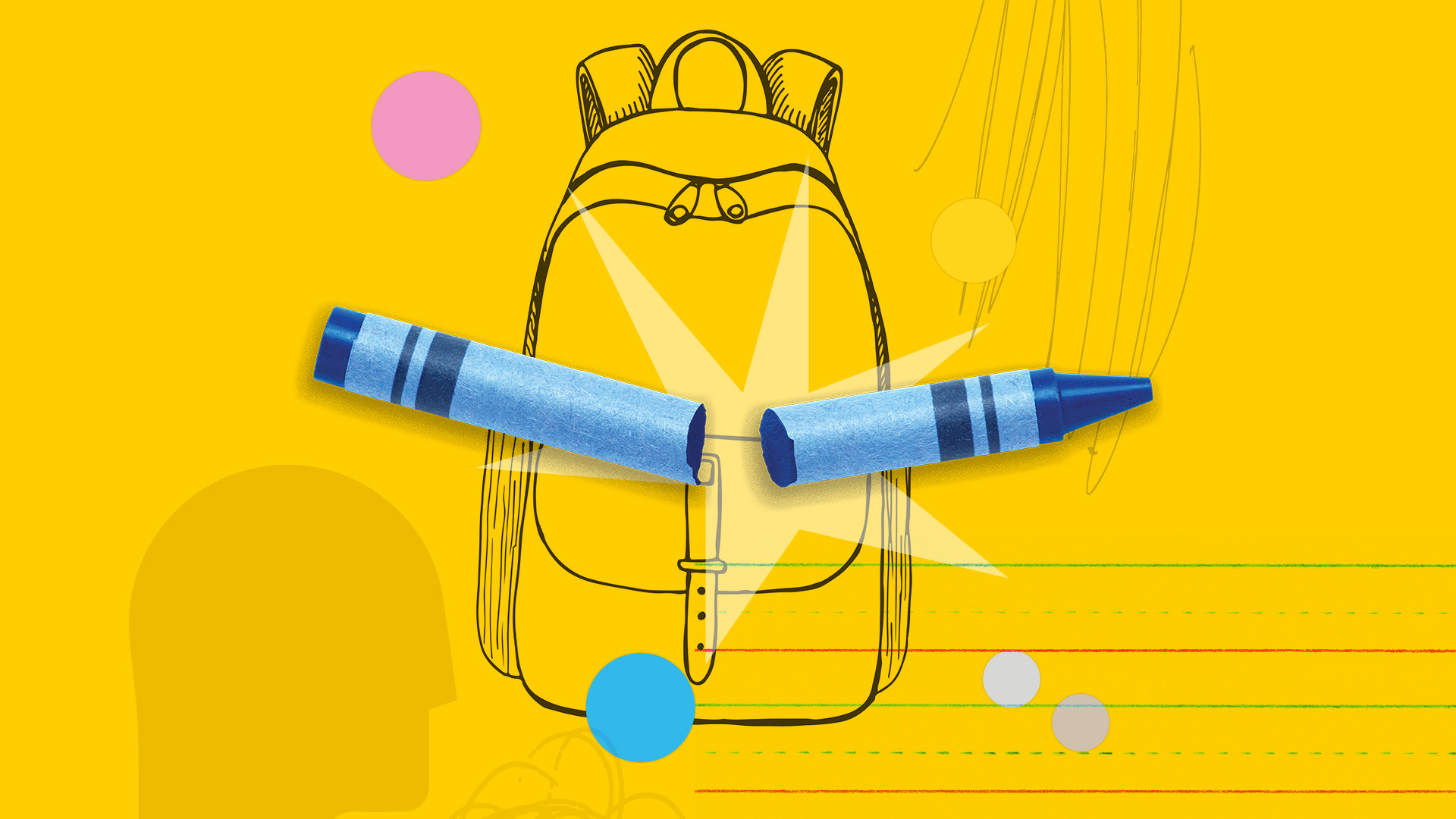With demand for mental health services surging in Iowa and across the nation, especially among young adults, the University of Iowa is working to create a culture of well-being.
Story: Sara Epstein Moninger
Illustration: Nick Beecher
Published: March 1, 2023
When your child is struggling with mental health issues, it can be all-consuming. The questions feel endless:
Why is this happening? Is there a diagnosis we can search online? What’s the difference between a psychologist, a psychiatrist, a therapist, a counselor, a licensed social worker, a nurse with psych-mental health certification? What if my community doesn’t have any of those providers? What if we find one and it isn’t a good fit? Why do we have to wait three months for an appointment? Can’t we get help now?
What about prescription medication? Is it safe? Will it increase suicidal thoughts? What if it doesn’t help? Do we have to remove sharp objects or lock up medicine? At what point is it reasonable to worry if they don’t come home? When should I call the police or 911?
What do I say? What if it’s the wrong thing? Is going to the emergency department the only way to get immediate help? Can I send them to school? To college? What if they attempt suicide? How are we going to get through the next 24 hours? What about the next two hours?
Will this ever end?
If this sounds familiar, you are not alone. Children are increasingly susceptible to mental health conditions, a trend exacerbated by the pandemic. The National Alliance on Mental Illness reports that in the United States, 1 in 6 youths ages 6–17 experiences a mental health disorder each year and that 37,000 Iowans ages 12–17 have depression. Shockingly, suicide is the second-leading cause of death among those ages 10–14.
The situation is dire enough that in 2021 the American Academy of Pediatrics, the American Academy of Child and Adolescent Psychiatry, and the Children’s Hospital Association declared a national state of emergency in child and adolescent mental health, urging policymakers and advocates to “improve the access to and quality of care across the continuum of mental health promotion, prevention, and treatment.”
University of Iowa leaders are answering the call—by expanding mental health awareness and outreach, adding campus services and programming, and sharing research and expertise across the state. In fact, the UI named mental health as a priority in its strategic plan, including it as part of its commitment to holistic well-being and success.
Sarah Hansen, vice president for student life, says Iowa has long focused on mental health, but over the past decade more students have been arriving on campus with mental health diagnoses and experience with therapy.
“The biggest change for us has been creating a constellation of help options for students, rather than assuming everyone will want individual counseling,” she says. “We also are investing in training for faculty and staff, so that as many individuals as possible on our campus are prepared to support students in distress. These efforts will help us create a culture of well-being on our campus.”
How to get help—for yourself or others
- Reach out to friends and family.
- See your doctor for an exam and get a referral to a mental health professional. Don’t wait for a crisis.
- Locate a provider at Behavioral Health Treatment Services Locator, a confidential database maintained by the U.S. Department of Health and Human Services.
- If you need immediate help, call or text 988 or chat at 988lifeline.org.

First, a focus on our students
Going to college is a huge life transition. Add the explosion of social media, an increasingly divisive national discourse, and a pandemic, and you have a recipe for disaster, Hansen says. Between 2013 and 2021, the number of college students meeting the criteria for one or more mental health problems doubled, according to a national study by the Healthy Minds Network. On the UI campus, University Counseling Service has experienced a 71% increase in student clients over the past five years, and Student Health logged some 4,000 visits related to mental health in 2020 alone.
“There seems to be a never-ending media feed of calamity that is hard to avoid and impossible to not feel on some level,” says Hansen. “I think our challenge is helping students understand that life has ups and downs and teaching them ways to manage the inevitable difficult times.”
Anxiety and depression top the list of mental health concerns among students—at Iowa and across the nation. Hansen says one of her priorities is to increase access to campus resources. But she also wants to make sure students are aware of them.
“Not everyone is comfortable seeking counseling, so providing lots of safe and open ways for students to get the help they need is critical,” she says. “In 2021, we started a local 24/7 crisis and support line, which offers texting and online chatting, so students can receive support in the mode that feels most comfortable. We’re trying to remove barriers.”
“We must focus as much on prevention as we do treatment. On the UI campus, we are encouraged to speak about mental health as a priority. Every program, department, and student organization agenda holds mental health and well-being at the forefront and allows us to bring people into the discussion.”
Campus programming on topics such as stress management, mindfulness, and meditation has tripled in the past few years, and the university offers free wellness coaching to students and lends out light boxes to those managing seasonal affective disorder. Hansen also hopes to expand the university’s embedded counselor program, in which members of University Counseling Service staff practice in specific areas of campus. Currently, there are dedicated counselors in the business, dentistry, and law colleges, while two others serve the 11 residence halls.
“Iowa’s embedded counselor program has been a model nationally, and one of the goals that President Barbara Wilson and I have is embedding at least one therapist in every college,” Hansen says. “That person becomes part of the college’s culture, and context is important—they know the rhythms of student life for that specific college.”
To further promote the importance of mental health care and increase awareness of and accessibility to existing resources, the university plans to convert space in the centrally located Iowa Memorial Union (IMU) into a health and well-being center that would house University Counseling Service, Student Wellness, and Student Health. Pending approval by the Board of Regents, State of Iowa, the project to modernize the IMU and add these services would be conducted in multiple phases to keep the building open. Completion is targeted for 2026.
Still, University Counseling Service is the university’s primary mental health service provider for students and has counselors available for both same-day and ongoing appointments, says director Michael Fletcher. The institution’s commitment to mental health was one of the things that attracted him to the job in 2022.
“We can talk and talk and talk, but if leadership isn’t supportive of an idea or an initiative, it’s not going to be done right. To see that support at Iowa was exciting,” says Fletcher, whose office offers consultations with UI departments and provides training for developing professionals. “We must focus as much on prevention as we do treatment. On the UI campus, we are encouraged to speak about mental health as a priority. Every program, department, and student organization agenda holds mental health and well-being at the forefront and allows us to bring people into the discussion.”
Kognito, an online suicide-prevention program that is mandatory for incoming UI students, recently upgraded modules for faculty and staff. Ultimately, Fletcher says, he would like to see everyone on campus trained in mental health first aid and in self-compassion.
“Mental health and well-being are everyone’s concerns,” he says, “and the only way we are going to get to where we want to be as a community is for everyone to participate in supporting mental health.”

Helping Iowa’s schools
Rising rates of depression and anxiety in youth have implications for the well-being of Iowa’s schoolchildren. Educators often are the first to identify mental health issues in students and make referrals, but many lack appropriate training. The UI is hoping to change that by leveraging the expertise of its faculty in the College of Education.
Allison Bruhn, UI professor of special education, spent three years teaching seventh- and eighth-grade science in Tennessee before earning a doctorate in special education and joining the UI faculty in 2011. She says she was surprised by the number of students in her classroom who had severe mental health and behavioral issues, making it difficult for them to learn.
“Many came from really traumatic home environments and a lot of poverty, and I didn’t feel prepared to help them. I decided to go back to school and learn more about how to serve them so I could have a bigger impact,” she says.
Now, as executive director of the UI Scanlan Center for School Mental Health, Bruhn serves students and educators across Iowa. A partnership formed in 2021 between the UI College of Education and the Iowa Department of Education, the center offers postcrisis services, short-term individual counseling via telehealth and in-person appointments, and training for pre-K–12 educators.
There likely will never be enough counselors in schools, Bruhn says. The recommended caseload for school counselors in Iowa is 250 students to one counselor, but the actual number is more than 400 to 1. She hopes that the Scanlan Center can help alleviate some demands on educators by providing them with tools and training.
“The number of expectations we have for teachers makes it such a difficult job,” she says. “If we’re going to prioritize kids’ mental health and make social-emotional learning part of our curriculum—and I think the pandemic has made people realize how important that is—then we need to provide to schools the resources and systems that allow them to do that.”
Through its team of directors, staff, affiliated faculty members, and graduate assistants, the Scanlan Center aims to provide social, emotional, behavioral, and psychological services to all of Iowa’s schools across 99 counties—for students as well as educators.
“Beyond what we’re seeing with kids, we’re also seeing an impact on educators. The level of stress and burnout that they have experienced pre-COVID has been exacerbated through the pandemic and is causing them to leave the field, and that’s a big problem,” Bruhn says. “So, in addition to training educators to address mental health issues in their schools, we offer them training in how to take care of themselves.”
In its first year, the Scanlan Center engaged some 3,000 educators through free professional development, including workshops on suicide prevention, community-building pedagogy, mental health first aid, mindfulness and yoga, and assessment techniques. A clinic in downtown Iowa City began accepting referrals in fall 2022 for students, educators, and school staff with mental health needs. Clinicians also travel to schools to provide services.
Additionally, the center has distributed more than $1 million in research grant funding and offered training fellowships to graduate students.
One of those graduate trainees is Alex Reed, a doctoral student in counseling psychology in the UI College of Education. He and Taylor Ford, the center’s assistant director of clinical services and crisis response, are planning to cofacilitate a psychoeducational group for high school athletes. He also contributed to a project that involved condensing materials in a crisis tool kit to make the information more accessible to educators in a crisis. He looks forward to conducting fieldwork in the western half of the state, especially in rural communities.
“I’m from western Iowa. The need is there,” says Reed, who grew up in Council Bluffs. “I want to work face-to-face with teachers, principals, and educators of all types and help train them to have better conversations with their students and to be more proactive than reactive. My passion, though, is to destigmatize mental health among student-athletes, since they are an exceptionally vulnerable population.”
Reed, who played basketball and football and ran track in high school, says student-athletes tend not to seek help when they’re struggling, often due to a culture within sports that views it as a sign of weakness. He wants young athletes to know they can be strong competitors while also addressing their mental health needs.
“Those don’t have to be mutually exclusive,” he says. “By teaching them how to employ positive coping methods and access resources, we can change the trajectory of their lives. These are skills that will help them navigate life when it gets tough—because inevitably it will.”
Mental health resources on campus
- Student Care and Assistance, part of the Office of the Dean of Students, helps students experiencing crisis and emergency situations, such as chronic conditions, death of a family member, natural disasters, hospitalization, and more. Initiatives include Hawkeye Meal Share, the Support Fund for Name Changes, the Student Life Emergency Fund, the Clothing Closet, and the IMU Food Pantry.
- The UI Student Support and Crisis Line, a partnership that began in 2021 with Iowa City’s CommUnity Crisis Services, is available to students 24 hours a day via phone, text, or online chat. The service recorded nearly 400 student communications in its first year, and UI leaders are working to increase awareness, including placing contact info on the back of student IDs.
- Kognito, a suicide-prevention program launched on campus in 2019, offers online role-play simulation for students, faculty, and staff to build awareness, knowledge, and skills around mental health and suicide prevention. The course is mandatory for all incoming students.
- The Employee Assistance Program offers confidential, short-term counseling to faculty, staff, postdocs, medical residents, and their families, and makes referrals to community resources.

A workforce boost
Compounding the challenges posed by mental health conditions is access to care. When you decide help is needed, you want it now. But “mental health care deserts” exist across the country, especially in rural counties, and providers without waitlists can be hard to come by. Some 1.8 million Iowans do not have enough mental health professionals in their community.
When Kara Carter started out as a practitioner of social work in southern Colorado, she quickly found that her expertise in mental health was badly needed—not just by the hospice agency that hired her, but by the community she lived in.
“I was probably one of the few licensed professionals in the county, and I’d be asked to speak with children who were going through various tragedies or to a youth club that had lost a student or to start a support group for parents who have lost children. And I found myself feeling ill-equipped,” says Carter, now a fourth-year doctoral student in social work at Iowa. “Even though I felt prepared to tackle these difficult subjects by my social work education, I still found myself reaching out for more training.”
In Colorado, Carter completed a bereavement counseling certificate, as well as training in a mental health therapy called eye movement desensitization and reprocessing. But she wanted to dig deeper into social behavior and have a bigger impact. Iowa’s PhD program was the perfect fit.
“Social workers are more and more understood to be allied health professionals, and at Iowa there are opportunities to partner and collaborate with people in the medical, nursing, and public health colleges,” says Carter, who earned a bachelor’s degree from Iowa before pursuing a master’s degree at the University of Georgia. “I wouldn’t have as many opportunities to conduct research at an institution without an amazing hospital like UI Hospitals & Clinics.”
The UI School of Social Work is the only school of social work in Iowa that prepares its students at the bachelor’s, master’s, and doctoral levels. Increased student interest in social work, in part driven by rising mental health needs, prompted the school to bump up its incoming cohort of undergraduates from 45 to 60 students, starting in 2023. The school also recently redesigned its master’s curriculum—which is offered in Iowa City, Sioux City, and Des Moines, as well as online—to focus on specializations in clinical practice and leadership practice. An undergrad-to-grad program allows undergraduates to earn an MSW, a requirement for those seeking to become independent counselors, in just 12 months.
The school’s goal, says director Mercedes Bern-Klug, is to educate social workers in all 99 counties of Iowa, boosting the state’s supply of mental health providers.
“Social workers provide more mental health services in this country than all other mental health professionals combined,” she says. “We’re trained to look at a person in their environment and make changes if the fit isn’t good. Other times we work to change the system.”
Carter, whose dissertation examines the lived experience of COVID-19 hospitalization for older adults in Iowa, plans to remain in the state and study the effects of long COVID-19.
“We need to continue understanding and researching human behavior and mental health, because there’s always going to be something new, like COVID, that comes along and upsets the apple cart and turns things that we’ve known upside down,” she says.
“Lives are at stake. Quality of life is at stake. When you’re just barely surviving and not thriving, not only is that a very uncomfortable place to be, but it can also become transgenerational. We’re teaching our kids everything.”
Campus collaborative to focus on mental health and well-being
In 2021, UI President Barbara Wilson formed a cross-disciplinary group to holistically review mental health needs on campus.
The Well-Being and Mental Health Campus Collaborative has two charges: embed well-being and mental health into all aspects of campus culture; and leverage research, collaboration, and action to improve the well-being of the campus, the state, and the world.
Following the Okanagan Charter, an international guide developed for postsecondary education institutions to cultivate a campus culture around well-being, the group’s leaders have pulled together some 80 people from across campus. Over the next three years, they will assess the mental health needs of various campus groups, evaluate existing programming, make recommendations for new or expanded programming, create a framework of services and resources available across campus, and make sure those services and resources are accessible.
